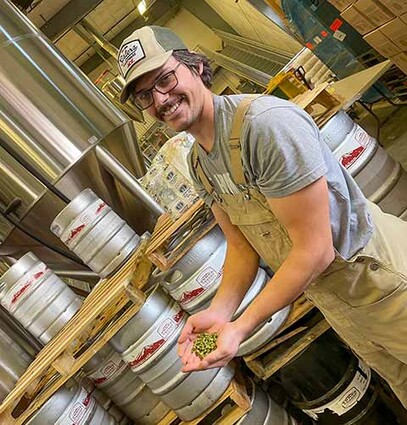Hop festival canceled — but not the hops
Last updated 9/21/2021 at Noon
If you think you and your friends are disappointed that this year’s 11th Annual Fresh Hop Festival has been canceled, imagine being a brewer. Imagine being the organizer, Three Creeks Brewing Co. Beer drinkers and event goers take for granted the months of work that goes into planning and promoting such an event.
Fresh hop beers from over 20 Oregon craft brewers were on slate alongside music bands, food carts, and other vendors. Then there’s the loss of the estimated $10,000 that would have been donated to Ronald McDonald House Charities, beneficiaries of the popular fall event.
What is fresh hop beer?
“In order for a beer to be considered ‘fresh hopped’ the hops must be picked and then brewed within 24 hours,” said Ryan McVey, brewmaster at Three Creeks Brewing Co.’s brew pub in the FivePine Campus. “The only time fresh hop beer can be created is during harvest season in late summer, early fall. Think of it as an herb: dried vs. fresh. You will still get the herbal notes from the dried herb, but when it’s fresh, you can really taste the difference.”
McVey is also assistant brewmaster for the larger 7,000-barrels-per-year operation off Barclay Drive that is unceremoniously called the “production facility.” The firm’s beers are distributed throughout the Pacific Northwest and parts of California.
Most of the United States’ hop production takes place in the Pacific Northwest, given its rich soil, rainfall, and mild air. Driving along Highway 200 or Highway 126, hop vines come into view. Hops are fast growing, herbaceous perennial vines that grow from underground stems to as much as 25 feet in one season. They are a prime ingredient in beer dating to the ninth century.
What’s used for brewing is the flower. There is a male and female of the species and only the female plants are used in commercial production. In addition to their bitterness, hops, like grapes, impart floral, fruity, or citrus flavors and aromas.
Brewers are very picky about their hops and with good reason. Beer recipes are highly guarded secrets and hop content is critical to the process. The hops we see along the roadside in Sisters Country do not meet Three Creeks’ requirements. They prefer a selection of Saaz hops from as far away as New Zealand and the Czech Republic, the latter being origin for the renowned hops going back 700 years.
When The Nugget visited, McVey showed us hops from the Yakima Valley. They were not green, aromatic flowers fresh from the vine. All craft brewers use a pelletized form of hops (think rabbit food). Growing, harvesting, drying, and pelletizing hops is a highly complex procedure requiring acres of production — another reason Three Creeks cannot use local hops.
What we see driving by are micro in nature and probably for home brewing, more of a hobby. The largest hop farm in Sisters Country is close neighbor Tumalo Hops, owned by Gary and Susan Wyatt. Ninety percent of the output from their hop yards is taken by Bridge 99 Brewing in Bend. The Wyatts grow six varieties of hops including a northwest craft brew favorite, the Cascade.
It can take anywhere from one to four pounds of hops per barrel, McVey says, and one of their brews takes 20. Hops are the featured ingredient in some dozen year-round and seasonal offerings. The hops have names that are part of a sophisticated branding scheme. In their Crowdpleaser IPA for example, Amarillo, Mosaic and Simcoe hops get top billing when promoting the brew. Crowdpleaser was voted Best of the Northwest Region in the 2020 U.S. Beer Tasting Championship.
Speaking of fresh hops, their Conelick’r Fresh Hop IPA won Gold Medal at last year’s Great American Beer Festival. That seasonal batch took 300 pounds of wet Centennial hops from BC Farms in Woodburn, Oregon. The hops went from farm to kettle in four hours.
That’s fresh.
McVey, Head Brewer Jeff Cornett, and owner Wade Underwood have more than an emotional disappointment in having to cancel the Hop Fest. McVey made quite a bit of fresh hop beer, more than can logically be consumed at the brew pub. Nowhere in Oregon are the many traditional autumn beer fests and Oktoberfests taking place in the current COVID-19 environment.
“This is the time of the year, after a full-bore summer meeting peak demand, we as an industry look forward to kicking back a bit with our fellow beer makers sharing in the joy and dedication of our work,” McVey said, with a tinge of sadness.
But he quickly recovered: “There’s always next year.”
Let’s drink to that.


















Reader Comments(0)